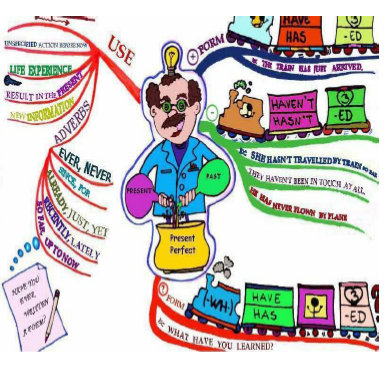Questões de Concurso
Sobre passado perfeito | past perfect em inglês
Foram encontradas 107 questões
Which verb tense the sentence below refer to?
"Has he been driving everyday?"
Instructions: answer the question based on the following text.

Source (adapted): https://www.bbc.com/news/worldafrica-50800864
1. ________ that movie with Brad Pitt?
2. I _________ home when I saw the accident.
3. They were sleeping when I ______.
4. We ______ TV all night long last night.
Complete the sentence below with the correct verbs. Choose the CORRECT answer.
“He _________ breakfast before he _________ his teeth.”
Choose the verb form that completes the sentence below correctly:
Fay was late for school yesterday.
When she arrived at school, the final test ...

This is a mind map about:
“Katie is in love with Paris. She can get around pretty easily as she _________ French.”
‘‘At the train station - A: What is your train number? B: I ________ for the 8814.’’
‘‘Two years ago, I ________ Physics to my pupils.’’
I - My brother has been teasing me since this morning. II - I am reading an excellent book. III - I have been to England twice. IV - My husband works everyday.
Chose the alternative that fills the gaps below CORRECTLY:
He ________ really pleased that she ________ there.
“I _________ a ring to my girlfriend before I _________ to her.”
Instruction: Answer question based on the following text.

Source: https://www.newyorker.com/humor/daily-shouts/the-eurohug-is-it-a-thing-a-global-guide-toembrace
I - To talk about permanent situations II - To talk about habitual situations III - In time clauses IV - In zero conditionals V - Future intentions VI - Events based on a timetable or known date
I - Once I had finished work, I went home II - I was cuting up vegetables in the kitchen when I heard it on the TV. III - Ellen has eaten no meat since she was six. IV - He believe in ghosts. V - I regularly play the piano.
Planet’s ocean-plastics problem detailed in 60-year data set
Researchers find evidence of rising plastic pollution in an accidental source: log books for planktonmonitoring instruments. Matthew Warren
Scientists have uncovered the first strong evidence that the amount of plastic polluting the oceans has risen vastly in recent decades — by analysing 60 years of log books for plankton-tracking vessels.
Data recorded by instruments known as continuous plankton recorders (CPRs) — which ships have collectively towed millions of kilometres across the Atlantic Ocean — show that the trackers have become entangled in large plastic objects, such as bags and fishing lines, roughly three times more often since 2000 than in preceding decades.
This is the first time that researchers have demonstrated the rise in ocean plastics using a single, longterm data set, says Erik van Sebille, an oceanographer at Utrecht University in the Netherlands. “I’m excited that this has been finally done,” he says. The analysis was published on 16 April in Nature Communications.
Although the findings are unsurprising, long-term data on ocean plastics had been scant: previous studies looked mainly at the ingestion of plastic by sea creatures over shorter timescales, the researchers say.
Fishing for data
CPRs are torpedo-like devices that have been used since 1931 to survey plankton populations, by filtering the organisms from the water using bands of silk. Today, volunteer ships such as ferries and container ships tow a fleet of CPRs around the world’s oceans.
(…)Each time a ship tows a CPR, the crew fills in a log book and notes any problems with the device. So Ostle and her colleagues looked through all tow logs from the North Atlantic between 1957 and 2016, to determine whether plastic entanglements have become more common.
Evidence analysis
(…)Van Sebille says that because the study focused on large plastic items, it doesn’t reveal much about the quantity of microplastics — fragments fewer than 5 millimetres long — in the oceans. These tiny contaminants come from sources such as disposable plastic packaging, rather than from fishing gear.
Nevertheless, he adds, the study demonstrates that fisheries play a major part in plastic pollution, and will provide useful baseline data for tracking whether policy changes affect the levels of plastic in the oceans. “As fisheries become more professional, especially in the North Sea, hopefully we might see a decrease,” he says.
Source: https://www.nature.com/articles/d41586-019-01252-0 (adapted).
Access: April 20th, 2019